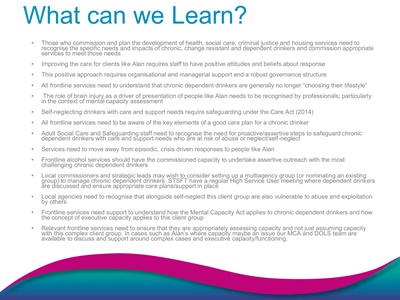
What can we Learn?
• Those who commission and plan the development of health, social care, criminal justice and housing services need to
recognise the specific needs and impacts of chronic, change resistant and dependent drinkers and commission appropriate
services to meet those needs
• Improving the care for clients like Alan requires staff to have positive attitudes and beliefs about response
• This positive approach requires organisational and managerial support and a robust governance structure
• All frontline services need to understand that chronic dependent drinkers are generally no longer "choosing their lifestyle"
• The role of brain injury as a driver of presentation of people like Alan needs to be recognised by professionals; particularly
in the context of mental capacity assessment
• Self-neglecting drinkers with care and support needs require safeguarding under the Care Act (2014)
• All frontline services need to be aware of the key elements of a good care plan for a chronic drinker
• Adult Social Care and Safeguarding staff need to recognise the need for proactive/assertive steps to safeguard chronic
dependent drinkers with care and support needs who are at risk of abuse or neglect/self-neglect
• Services need to move away from episodic, crisis driven responses to people like Alan
• Frontline alcohol services should have the commissioned capacity to undertake assertive outreach with the most
challenging chronic dependent drinkers
• Local commissioners and strategic leads may wish to consider setting up a multiagency group (or nominating an existing
group) to manage chronic dependent drinkers. STSFT have a regular High Service User meeting where dependent drinkers
are discussed and ensure appropriate care plans/support in place
• Local agencies need to recognise that alongside self-neglect this client group are also vulnerable to abuse and exploitation
by others
• Frontline services need support to understand how the Mental Capacity Act applies to chronic dependent drinkers and how
the concept of executive capacity applies to this client group
• Relevant frontline services need to ensure that they are appropriately assessing capacity and not just assuming capacity
with this complex client group. In cases such as Alan's where capacity maybe an issue our MCA and DOLS team are
available to discuss and support around complex cases and executive capacity/functioning.